A salesperson’s ability to extract useful information from a prospect is paramount to their success. Questions are the primary tool by which someone would get information from another person.
In fact, research shows 22% of salespeople list discovery as the most difficult part of their job, which makes sense. In most situations, there are numerous questions you could potentially ask. However, since you have a finite amount of time with a prospect, you have to be efficient with your questioning.
To get to the answers that help you close the deal, we’ve put together a guide on effective sales discovery questions that helps you really understand your prospect, so you can help them problem solve and realize the value of your solution.
Plus, as a bonus, we've also added our top nine strategic discovery questions examples to ask prospects during the discovery phase when you want to get the ball rolling.
Let's get down to it!
What are sales discovery questions?
In B2B sales, sales discovery questions refer to the questions a salesperson will typically ask during a discovery call. The main goal of discovery call questions revolves around building trust, identifying prospect’s needs, their roadblocks, and how your product can help them achieve their goals.
Understanding the value of efficient sales discovery call questions
Journalists and salespeople are more alike than they're different. Both interact with humans on a daily basis, they're both looking for problems (and solutions), and both ask questions. In both cases, asking the right questions is fundamental to success. The wrong questions can lead a journalist off-trail and put a damper on a sales process faster than a bolt of lightning.
You could have the best product in the world, the best service, and the most attractive pricing -- If you don't ask the right questions, you won't understand your customer's actual needs to respond to.
Here's a quick overview of what good discovery sales questions could do for you:
- Help you identify and qualify potential customers
- Give you a better understanding of their current situation
- Uncover their needs and wants
- Understand their purchasing process
- Determine the best solution for them
- Identify roadblocks that could stop them from buying early
- Help you understand how they make decisions
- Establish trust and rapport
- Show that you care about them (genuinely!)
- Better understand where in the sales process your prospects are
While we've discussed the role of discovery questions, it's important to understand how these differ in B2B and B2C scenarios.
Differences in B2B and B2C discovery questions
When we delve into sales discovery, the distinction between B2B and B2C contexts is crucial.
In B2B sales, discovery questions often aim to uncover deeper, organizational-level challenges. These questions are designed to probe into long-term business goals, operational pain points, and the decision-making hierarchy. For instance, a typical B2B discovery question might be:
"How does this challenge align with your overall business strategy?"
Example of a B2B discovery question
Conversely, in a B2C setting, the discovery process is more personal and immediate. Here, questions are tailored to understand individual preferences, immediate needs, and personal benefits. A common B2C question might be:
"How would this product fit into your daily routine?"
Example of a B2C discovery question
Understanding these nuances is key to crafting effective discovery questions that resonate with the target audience, whether they are individual consumers or business entities. For the purpose of this guide, we'll focus on discovery in a B2B context.
The art of asking: Being conversational not interrogative
As highlighted by Salman Mohiuddin, a former Strategic Enterprise Sales representative at Asana & Salesforce, in his LinkedIn post, the effectiveness of questioning isn't simply about the act of asking - it's about the manner and approach of asking.
You want to sound less interrogative and more conversational. Here's a breakdown of how to transform your questioning approach:
How to build a strategy for your effective discovery
People like hearing templated discovery questions about as much as they like having someone call them during dinnertime. If you don’t want your discovery meeting to feel like a cold call, you need to adapt to:
- The person in front of you
- Their pain points
- Business goals
- And biggest challenges
Creating a successful discovery process boils down to two golden rules:
- Tailor your questions to the individual's specific stage in the buyer's journey
- Make sure your questions contribute to the conversation by helping them understand their problem/painpoints better
Let's take a closer look.
Ask questions for each stage of the buyer's journey
During a sales discovery call meeting, one of your main goals is to meet your prospect where they are -- and make sure they know this isn’t yet another hard pitch without context.
Good sales professionals adapt questions to the specific stage of the buyer's journey in a smart way to ensure you keep the conversation close to your prospect's pain points.
Here are some examples of discovery questions to ask a customer by stage:
Awareness stage:
- What are your goals for the next year?
- How will implementing a solution help you achieve your goals?
- What are some other ways you're working towards your goal?
Consideration stage:
- What solutions have you considered so far?
- What criteria are you evaluating when considering a solution provider?
- What budget have you allocated to solving [problem]?
- What is your current solution (if any) doing well? What isn’t working so well?
Decision stage:
- Who would we need to involve early to ensure there is alignment?
- How can we help ensure a successful implementation of the solution?
- What do you consider to be the most important success criteria for this project?
Make sure your questions contribute to the conversation
Although there's no one-size-fits-all recipe for a great discovery call, there are a few best practices to keep in mind when trying to build a positive sales conversation:
Start with the least sensitive questions
Building trust happens gradually, so it's important to ease into the conversation, especially when it’s your first call. Don't start asking questions about budget or key decision makers.
Instead, open by better understanding why they're speaking to you or why they took your call.
Listen more
This is, ultimately, the best rule of any communication. In the cult classic book, How to Win Friends and Influence People, Dale Carnegie spoke about the power of showing genuine interest in the other person. And although he wrote it down in 1936, the advice is more relevant than ever. In a world of always-on, 24/7 selling, being someone who actually listens is a rare and valuable (!) skill.
Focus on the prospect, not the product
It doesn't matter what you're selling: if you bring up your product every other sentence, you'll lose your prospect. Focus on them, how you can help them achieve their goals, and how they can benefit from your solution. Not only will this yield better information exchange, but it will also make you more likeable.
Be flexible
Your goal is to facilitate productive dialogue, not interrogate.
Listen to your prospect and adapt to their answers. Ask follow-up and open-ended questions that digs deeper as little deeper as the conversation progresses. Remember, your discovery call questions aren’t about reciting the same list of 'proven' questions to every potential customer that comes your way: it's about really learning more about them.
Be mindful of the time
Finally, don't forget to respect the customer's time. Keep your discovery call within a reasonable (and mutually agreed) timeframe. Make sure to use conversational signposts and check-ins so that your customer knows you're actively listening to them and understanding their needs. This will build rapport and trust with your customers — and eventually close more deals too.
Research your prospect
A quick look at your prospect’s LinkedIn can tell you more about where they live/ work, their experience, who the organization’s internal stakeholders may be, and why their company may be in the market for a new solution like the one you offer.
A bit of research can go a long way in making your sales cycle smoother and more efficient.
9 discovery questions used by successful sales reps
As promised, here are the top nine strategic discovery questions to ask a customer we recommend using during the discovery phase of your sales process:
1. Tell me about how your current approach to [problem]?
It's likely your prospect already has some makeshift process or solution in place. However, them chatting to you is indicative that it isn't working as well as they would like and your solution could be beneficial.
By asking about how they currently approach the problem, you're opening the door to find out where they're struggling and specific, tangible pain-points you can tap into later. This gives you a sneak peek into how your product might swoop in and save the day. For example, here at Qwilr, we often hear from folks who are tired of the endless cycle of updating and resending business proposals or contracts for signatures.
Knowing this, we can smoothly pivot to a quick walk-through of our product and how it solves their specific pain points – that way it's not a generic demo but a preview of what they would be able to do with our solution.
When you understand your customer’s current process, you’re able to better position yourself as the next evolution.
![“Tell me about how your current approach to [problem]?”](https://cdn.sanity.io/images/vhpgdzfc/production/01fb7cacba3204400e62a546ca6db23a01f4bbd8-1920x1080.png?q=70&auto=format)
2. How is [problem] affecting your business day to day?
When you ask your prospect how a specific problem affects their day-to-day operations, your real aim is to pinpoint opportunities or areas where your product or service could be applied.
To take it a step further, consider quantifying the information your prospect shares. For instance, at Qwilr, we often hear that sales teams spend 2-3 hours each day crafting sales proposals.
With our online proposal software solution, Qwilr, we can significantly cut down that time. By factoring in the average salary of a salesperson, we can use an ROI calculator to quantify the cost of manual processes for our prospect, demonstrating the value of our solution.
Whenever you can illustrate to a prospect that their current process costs more than your solution, it makes the decision to proceed with your offer a clear-cut choice.
![“How is [problem] affecting your business day to day?”](https://cdn.sanity.io/images/vhpgdzfc/production/5237651345f43a2f5f00eb6503af9f6b4d9bfe49-1920x1080.png?q=70&auto=format)
3. What do you hope to achieve by implementing a solution?
Let's face it, we purchase anything for one fundamental reason: to address a challenge. While we may not always articulate it in this manner, that's the reality. For instance, when you purchase food, you're tackling hunger. Similarly, buying a coat is your solution to staying warm.
Your potential client is no different. They have a problem and you have an opportunity to win their business by effectively demonstrating how your product or service can resolve it. However, the prerequisite to doing this successfully is a comprehensive understanding of their issue.
While it might seem daunting to ask straightforward, potentially uncomfortable questions, doing so significantly enhances the efficiency of your sales process. It's certainly worth investing your time in this approach, as only 13% of customers believe a salesperson truly grasps their needs. Given its crucial role in the sales journey, this query is best posed early in your discovery phase.
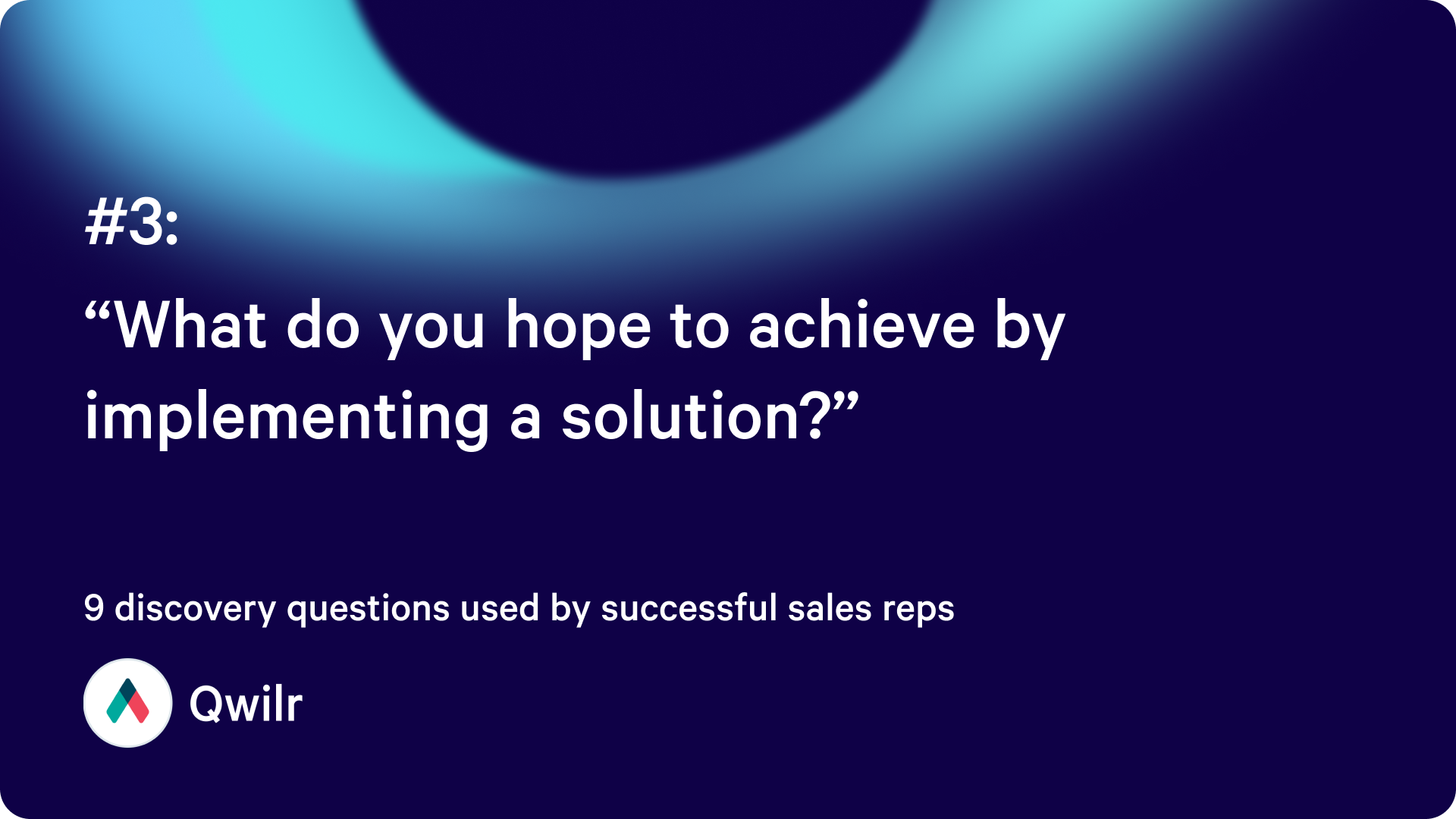
4. What’s your biggest strategic priority for this year?
Every prospect has a unique set of objectives they're striving to achieve within the year. Some may be aiming to streamline their operations, others might be focused on driving revenue growth, enhancing customer service, or bolstering their security framework.
Asking about their top strategic goal for the year provides you with valuable insights into what's most important to them right now. This allows you to tailor your approach and demonstrate how your product or service can support them in achieving this goal. It also helps to identify any potential obstacles or objections, enabling you to address these proactively and align your solution with their strategic direction.
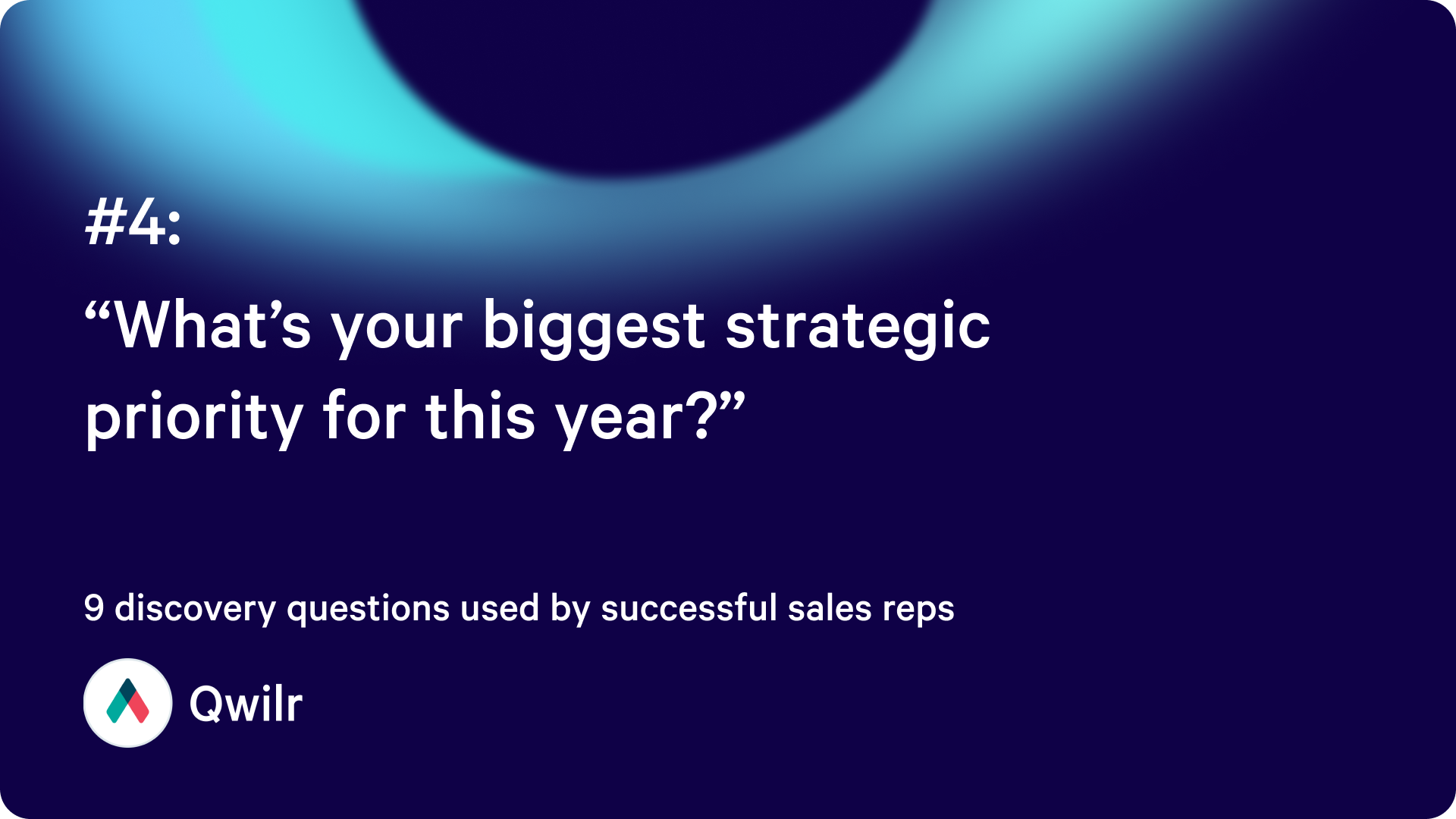
5. What metrics are you responsible for?
We all have targets to hit. Most of us gauge our success by tracking certain key metrics. For instance, a sales team might be primarily focused on monthly recurring revenue (MRR).
Much like other questions in this article, the main objective here is to gain deeper insight into your prospect's responsibilities and tailor your pitch accordingly. Being able to illustrate precisely how your product or service could positively influence their crucial metrics can be extremely compelling.
Understanding their metrics not only allows you to speak their language but also aligns your solution with their success.
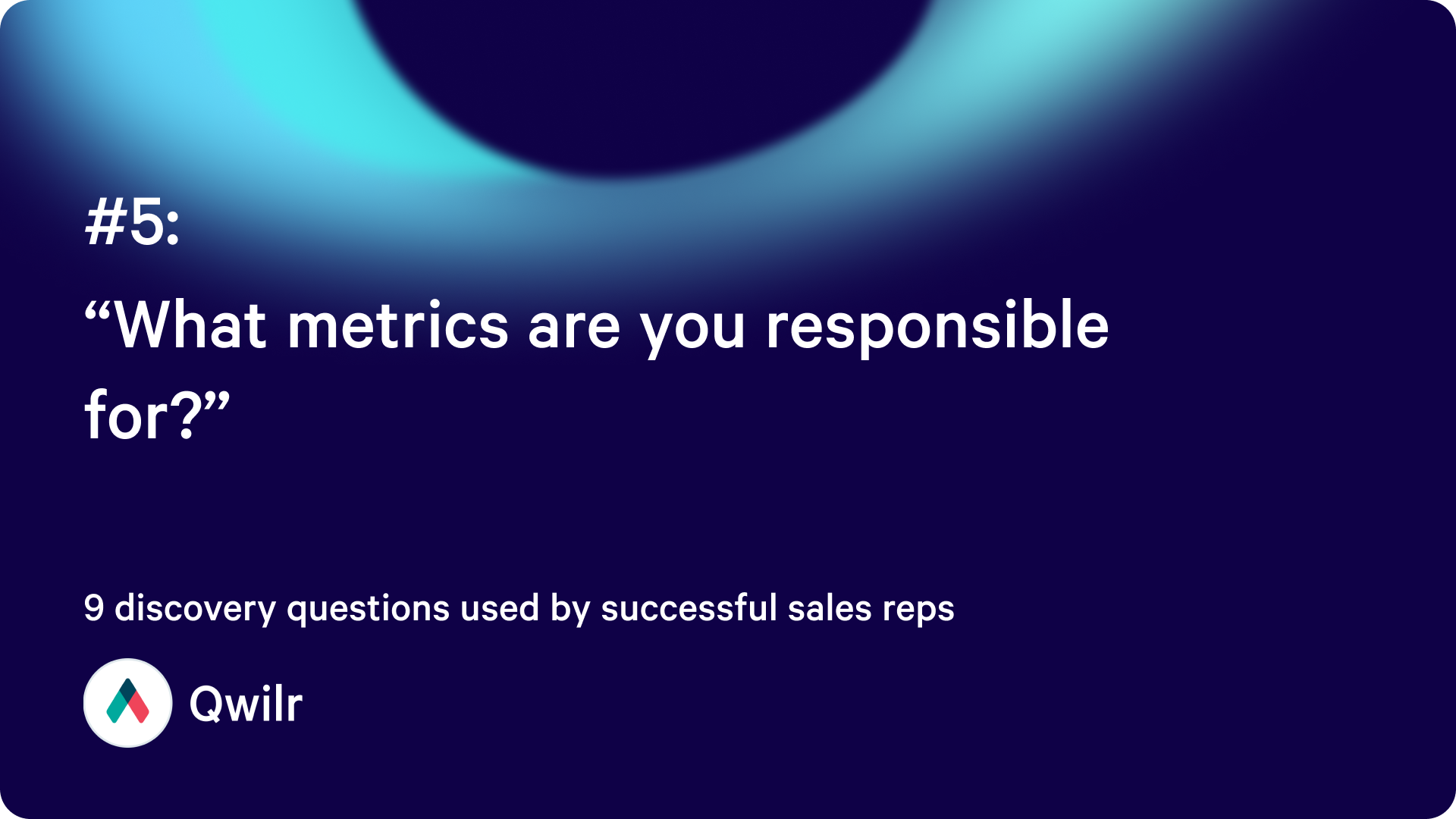
6. What your timeline for addressing [problem]?
Understanding your prospect's timeline can be as crucial as any other aspect of sealing a deal. If you're aware of whether they have a specific timeline in mind, you gain a clearer picture of where they stand in their buying journey and how urgently they need a solution.
If they're unable to provide a firm timeline, it's likely they're still in the early stages of their decision-making process, probably conducting research. On the other hand, if they're working towards a strict deadline, it indicates they're more serious about finding a solution and might be on the verge of making a purchase.
By understanding their timeline, you can better align your sales approach to match their urgency and readiness to buy.
![“What your timeline for addressing [problem]?”](https://cdn.sanity.io/images/vhpgdzfc/production/499e23b3494fbd5856a5dde25c584a6c0d7b11e1-1920x1080.png?q=70&auto=format)
7. What would happen if we solved [problem]?
Whenever we make a purchase, we hold certain expectations of the product or service we're buying. These expectations extend not only to how the product or service functions, but often also to the purchasing process itself.
By asking about the ideal outcome, you're actually delving into the prospect's expectations. For instance, if you're selling software which is designed to solve laptop storage issues, they might anticipate your team assisting with setup and integrations. They could also have expectations around the duration of the software implementation.
Regardless of the specifics, it's beneficial to understand these expectations upfront. This way, you can adequately prepare and plan to meet them. Remember, the sales process doesn't conclude with a signed deal - managing and meeting customer expectations is an ongoing process that extends well beyond the initial sale.
![“What would happen if we solved [problem]?”](https://cdn.sanity.io/images/vhpgdzfc/production/877ecec5eea156ce5c1362513db9f826b9b39c58-1920x1080.png?q=70&auto=format)
8. For similar purchases, who was involved in the decision making process?
As teams have become increasingly cross-functional and purchases more complex, the number of people involved in buying decisions has expanded. Typically, six to ten individuals partake in most purchasing decisions.
When you directly ask who the decision-maker is, it's common for the prospect to simply state that they are. However, by subtly shifting the question to their experience with previous similar purchases, you often unlock richer insights. This approach can jog their memory, revealing key information about other stakeholders, such as a budget owner or individuals who need to approve the purchase or implementation, like legal or security teams.
The real goal here isn't to get a list of all decision-makers' names but to comprehend the roles and influence across the buying committee. For instance, your pitching strategy would differ if you're addressing a sales manager versus an account executive.
Recognizing who else contributes to the decision equips you to start preparing early for these conversations and understand what matters most to each deal influencer. This knowledge allows you to tailor your approach effectively, ensuring each key player feels heard and considered.
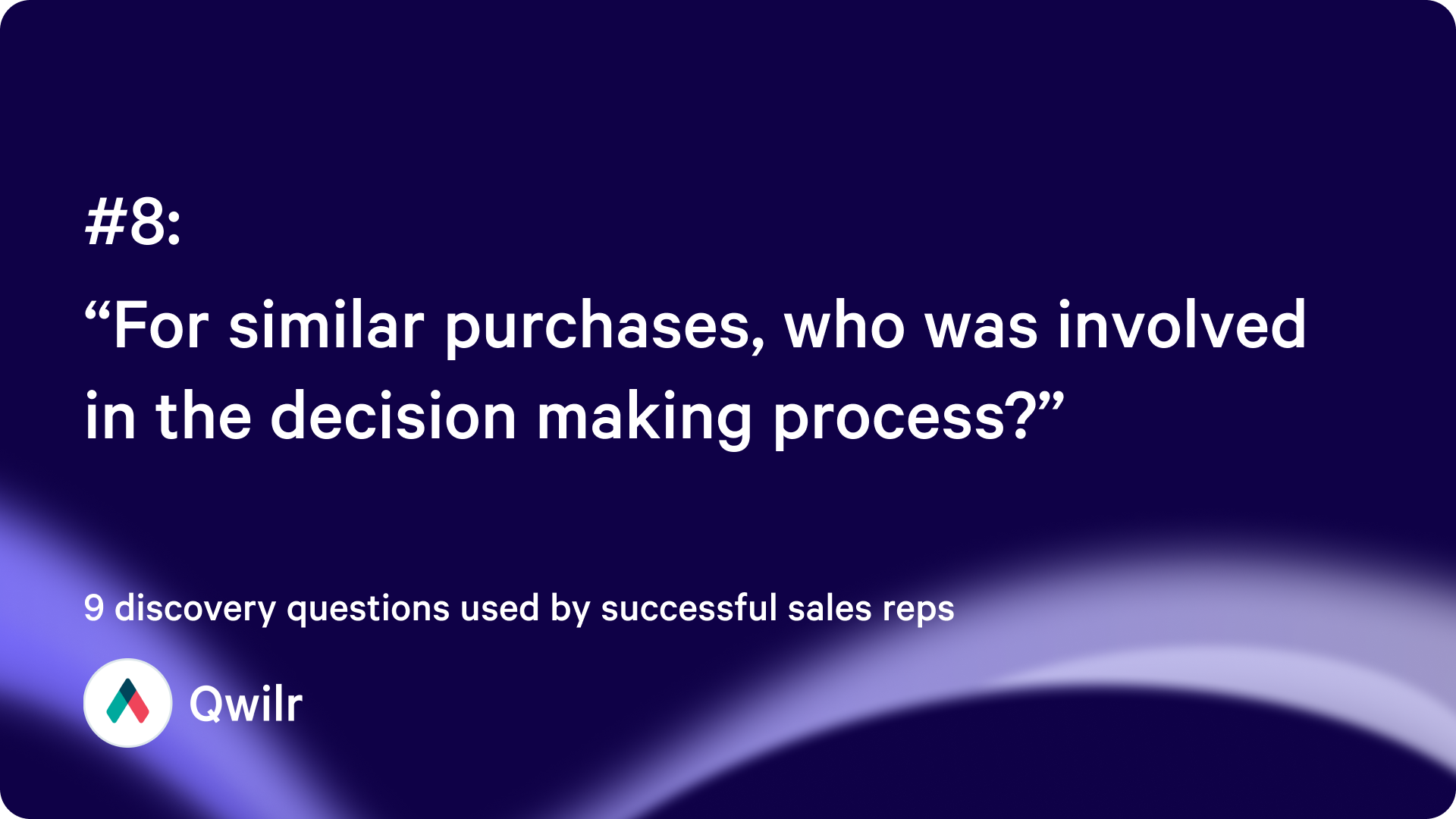
9. What potential roadblocks are we likely to run into?
There's a wise adage, "An ounce of prevention is worth a pound of cure." It emphasizes that being prepared upfront can save significant time and effort down the line. In sales, there's always a myriad of potential obstacles that could crop up. If you're caught off guard, these can cause substantial delays and complications.
While it might feel a bit forward to ask a prospect about any potential hurdles they foresee, it's the most efficient way to stay informed. If they do express concerns, you'll be in a position to tackle them proactively, potentially averting a deal-breaker. This approach ensures that you're equipped to navigate any bumps in the road and keeps the sales process moving smoothly.
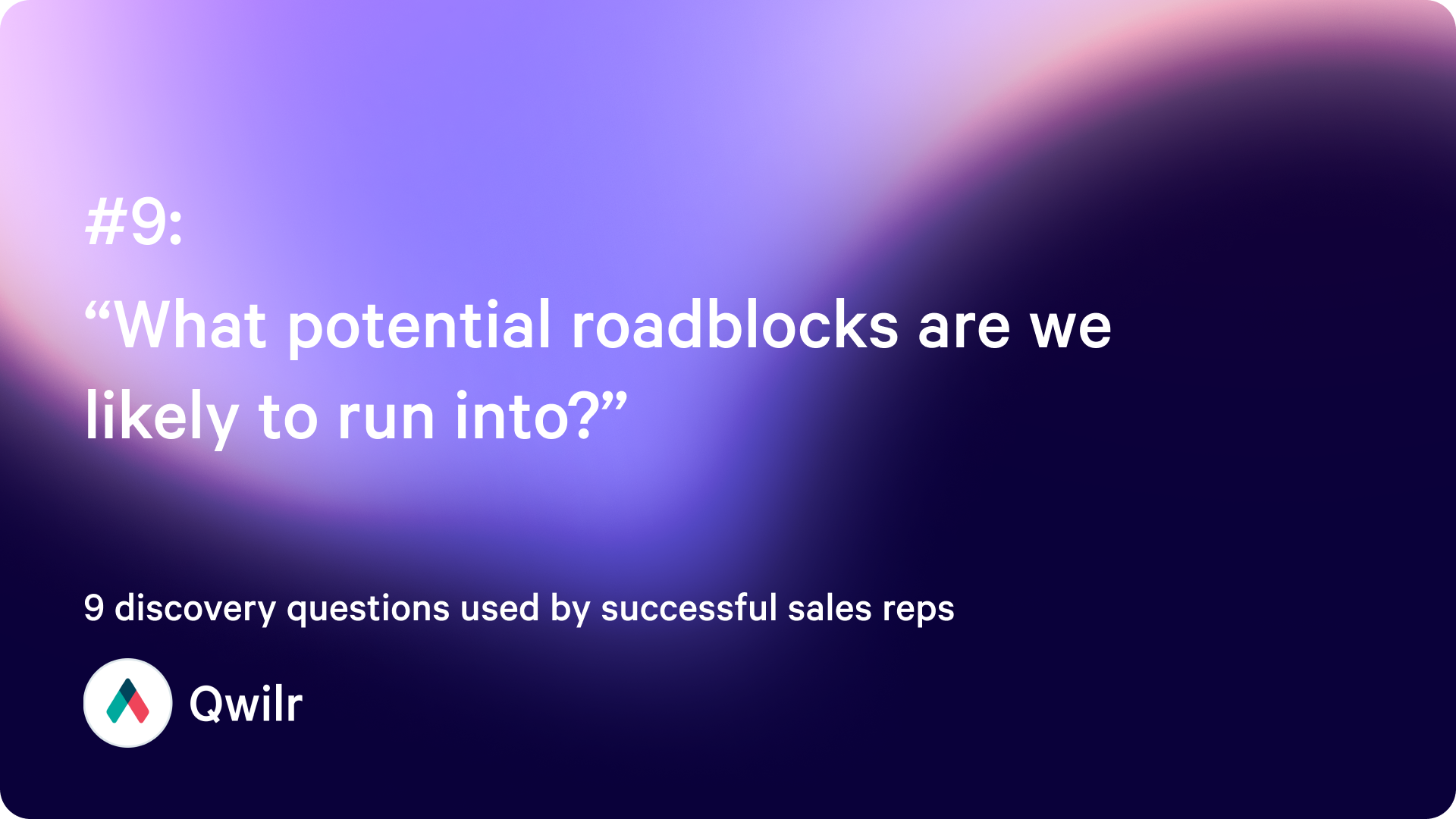
After mastering the art of asking the right discovery questions, the next step is measuring their effectiveness. This is where the integration of CRM and sales enablement tools can be helpful to build an objective and informed view of what questions are helpful for accelerating deal cycles and winning over prospects.
Measuring the effectiveness of discovery questions using CRM and sales enablement tools
To effectively measure the impact of your discovery questions, it's essential to set up your CRM system strategically or use popular sales enablement solutions like Gong.
These tools enable you to analyze how prospects respond to different questions, helping sales teams pinpoint the most influential queries.
Additionally, reviewing call recordings to identify trends in customer responses and sentiments, combined with CRM data on buyer personas and interaction histories, offers valuable insights.
This data-driven approach empowers sales representatives to reflect on their discovery techniques, seek coaching from more experienced sellers or leaders, and ultimately enhance their sales outcomes.
Staying curious
Learning about your prospect and their needs is integral to the sales process. One of the best ways to do that is by asking thoughtful questions to your prospect. Though there are any number of questions you can ask, the ones mentioned above should be a good place to start.
The more sales conversations you have, the more you can develop a bank of questions you can pull from to make sure you get the most out of your conversations. As long as you’re earnest in your effort and curious about your prospects, you’ll be on the right path.
About the author

Brendan Connaughton|Head of Growth Marketing
Brendan heads up growth marketing and demand generation at Qwilr, overseeing performance marketing, SEO, and lifecycle initiatives. Brendan has been instrumental in developing go-to-market functions for a number of high-growth startups and challenger brands.


